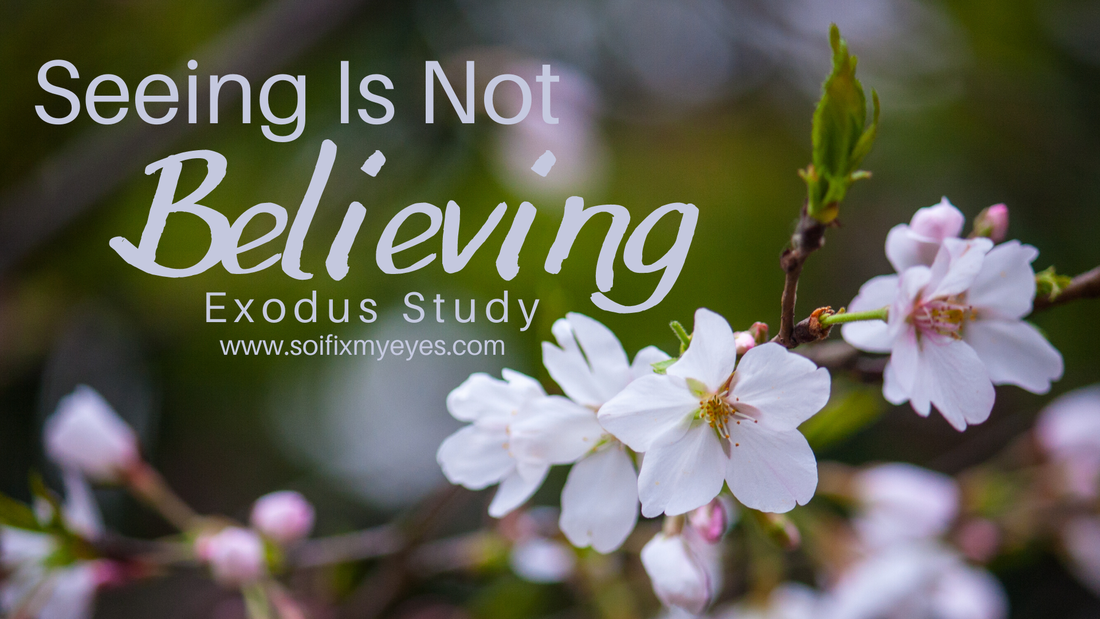Seeing Is Not Believing4/4/2020 There’s a common saying out there “seeing is believing.” But there are a few characters in Exodus that defy this catchy idiom. Remember the story of the Golden Calf from your Sunday school days? While we’re not at that point in our study of Exodus yet, there is a very interesting little passage here in Exodus 24 that directly connects with that well known story of Israel’s quick abandonment of God. Do you remember who the key players of the Golden Calf incident were? Aaron and the elders of Israel. Well, those same key players were part of an amazing experience a month before the Golden Calf drama. “Then Moses and Aaron, Nadab, and Abihu, and seventy of the elders of Israel went up, and they saw the God of Israel. There was under his feet as it were a pavement of sapphire stone, like the very heaven for clearness. And he did not lay his hand on the chief men of the people of Israel; they beheld God, and ate and drank.” ~Exodus 24:9-11 They saw God!!! Can you believe it! Aaron and seventy three other leaders of Israel got to see and experience the living God. What an honor! What an experience! It says in the text that they beheld God and did not die.
After an experience like that you’d think their lives would be forever changed. Remember when Moses encountered God in the burning bush? That experience forever altered the course of his life. He was no longer the same person after that encounter. But what about these men? Did seeing and beholding God change their lives? Unfortunately not. Notice in the text that there is no mention of awe or wonder, no mention of fear and trembling. From the matter of fact manner of relaying the information, you’d almost think this was an ordinary experience. A day in the park, so to speak. In verse eleven, it says they beheld God, and ate and drank. Almost like, “oh, there’s God; let’s go back to feasting.” Seventy three men saw the physical presence of God, but it didn’t change them. Men who were in leadership over God’s special people. Men who had seen the miracles in Egypt, walked through the parted Red Sea, eaten the manna from heaven, and watched Moses faithfully and patiently lead the people. Now these same men got to behold God. But it didn’t change them. They were unimpressed. Seeing God didn’t lead them to believe in His power, authority, and majesty. For them, it was just an unusual experience, but not a holy moment. Therefore, a mere month or so after this experience, they were totally willing to create an idol even though God expressly forbid such an activity. They were fine with leading worship services to a graven imagine. They were comfortable moving with the climate of the culture and pleasing the people even when it went against the laws God had just given them. They were ok with all of that because seeing God didn’t change their lives. They were not humbled by His presence or awed at His glory. Nothing within them changed. This is scary to contemplate! That leaders, such as these, could see God with their own eyes yet be unmoved is sobering to consider. But it’s an important lesson for us. Seeing doesn’t always mean believing. We can see God, see His power, see His authority, see His glory, but unless we humbly fall at His feet and acknowledge that He is God, we will become like these men. Going through the motions of Christianity, saying all the right words, doing all the right things, and even experiencing the presence of God will not save us and bring us into a personal relationship with God. Only our response to who God is will bring about life-long transformation. Moses was transformed at the burning bush because he humbled himself before God and allowed God to work in and through him. He became the mighty leader of Israel because he cultivated a personal relationship with the great I AM. And as we’ll see next week, because of this, God drew Moses closer to Himself. He invited Moses into His very presence and revealed His glory. The same cannot be said for the seventy three elders of Israel. So the question for us today is: who are we going to be? Will we be like the elders who saw God but remained unchanged? They experienced the presence of the great I AM but were later willing to lead the people into idolatry. Or will we be like Moses whose life was transformed by an encounter with the living God? He got to commune with God in a very personal way and was used by God to do great and mighty things. Which leader do you want to become?
0 Comments
Your comment will be posted after it is approved.
Leave a Reply. |
Kristin RenferView the About page for more info on the author. Receive Posts via EmailArchives
August 2020
Categories
All
�
|


 RSS Feed
RSS Feed